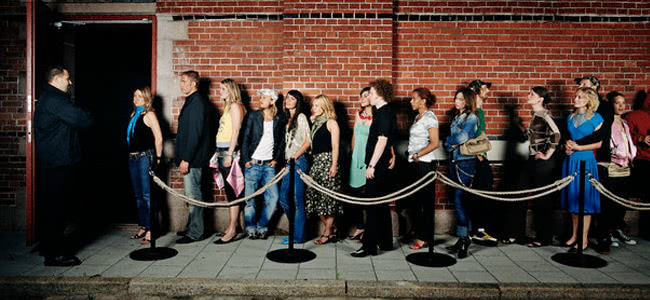If you’ve been waiting for the day that modern technology finally catches up with the kind of sci-fi effects we see in the movies, then you might want to pay a visit to some of Melbourne’s nightclubs.
The recent introduction of ID scanners to some of the city’s pubs and clubs is helping the venues keep their outlets safer, which may be why Sydney is looking at plans to follow suit, but others – including the police force – are addressing concerns over privacy and security.
As The Age reports some of Melbourne’s late-night bars and music venues, including popular club Chasers, the Night Cat and Crown Casino, have begun using machines that punters are now having their licenses and fingerprints scanned upon entry.
Venue proprietors are saying that the new technology is helping to keep records of troublemaking customers, aid in detecting fake IDS and helping with the added bonus of market research.
Brian Kearney, Chief Executive for Australian Hotels Association Victoria said the scanners had played an important role in the reduction of crime in licensed venues, which a recent police report demonstrates is down 4.3% from the previous year.
Kearney said that the ID scanners had been “a significant contributor” to that reduction, ”in combination with CCTV and a whole range of technological interventions, which serve as a strong deterrent.”
Chasers nightclub, located in Melbourne’s Chapel Street, was one of the first major clubs to install the $10,000 technology after an incident involving a man who entered the venue with a liquid sulfur bomb in 2007. Martha Tsamis, the nightclub’s owner says that “had I had the machine [at the time]… he probably wouldn’t have walked in to do it, and I wouldn’t have put my customers, staff and myself in danger.”
Ms Tsamis added that since installing the ID scanner she had noticed a fall in violent incidents at the club, as well as increase of safety with the appearance of more female patrons. ”People feel safe, they know that if they come in here, and someone does something, that they’ll be caught,” Ms Tsamis said. “We need this machine to hand over people to the police when there’s a problem.”
Chasers now uses three license scanners and also has an offline searchable database, using the machines based on information from the police about offenders in and around the Melbourne area. Despite the record-keeping, Ms Tsamis said the club destroyed and personal information within 28 days, the same policy they use for their CCTV camera footage.
So while the venues champion the effective use of ID scanners, which for music lovers, could mean having your information taken for attending a gig, the Police have concerns about the rising fears of identity fraud and privacy that the new security measures represent.
Yesterday, Police Commissioner Timothy Pilgrim told The Age that his office had received an increasing number of complaints from patrons uncomfortable with handing over personal information just to obtain entry to a venue.
“These technologies offer the opportunity for personal information to be digitised, which makes it much easier to copy or transfer,” warned Mr Pilgrim. “This increases the potential for it to be used or disclosed for purposes that the person may not have expected or wanted. It may also open up the person to an increased risk of identity theft or fraud.”
Pilgrim’s office were investigating into the use and policies of the clubs and venues using ID scanners to make sure their handling of personal information obtained from the machines was not only responsible, but fell in line with their obligations under the Privacy Act.
Namely that the collection of people’s personal information must be fully disclosed to patrons as to “why they are doing this and which organisations the information may be disclosed to.” Additionally pubs and venues must provide all information retained upon request, and all of this information “should be prominently displayed at point of entry to the venue,” said Commissioner Pilgrim.
While the police force agreed that the ID scanners could help provide with “another avenue of inquiry,” they urged the general public to report any matters of their personal information being misused.
The concerns over venue’s use of ID scanning technology comes just after the NSW Government’s announcement of plans to crack down on venues with the introduction of mandatory ID scanning, as well as the introduction of drastic new measures (such as sniffer dogs) to ensure the safety of the late-night Sydney CBD.
A move echoed by Mayoral candidate John Elliott, who proposed last week that he wanted to introduce a 1am curfew to the city of Melbourne. “I really believe that is a very important thing to do,” said Mr Elliott of the supposed concerns over late-night safety in the CBD, “we have got to make it easier for the police to deal with it.”




































